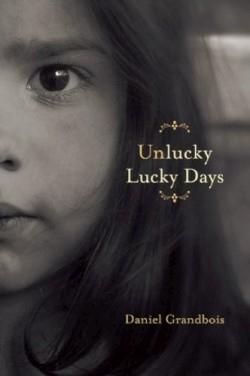Unlucky Lucky Days
The stories of Unlucky Lucky Days are the kind grown-up readers have probably forgotten how to enjoy. Part fable, part creation myth, these seventy-three whimsical tales by Daniel Grandbois are bedtime stories at their best.
Grandbois has the difficult task of jogging his audience’s memory, re-teaching them what was once second nature: wonder (otherwise known as a suspension of disbelief). The first story, “The Yarn,” sets readers up for rethinking their adult expectations of fiction. The protagonist, a ball of yarn, is detained by a violin spider. “The yarn stopped itself in its tracks and laid itself out, as that is how yarns tell their tales.” Many of these pieces are similarly aware of how mischievous they are, of what fun they are having.
Yarn is not the only inanimate object to play a leading role. Other characters include a stain, a snowman, body parts, and even wads of gum. Animals are also common, including a giraffe named Happy Birthday Grandma. This world is nearly devoid of men and women. As the speaker cautions in “Sunny Side Up,” “Cages don’t always mean humans, especially in stories in which there are none.” Of course, the creatures caging themselves seem to be warnings for people too comfortable in their houses.
Elsewhere in this collection, the moral is not so evident. Unlike traditional parables in which the meaning is obvious—be kind to your neighbors or never trust a crocodile—these stories conclude with riddles rather than platitudes. The moral, or just as likely, the punch line, is out of reach. The result is stories that never condescend and always delight, as if making sense is overrated, a bad adult habit.
Unlucky Lucky Days is not the only recent demonstration of Grandbois’ imagination. His book The Hermaphrodite (An Hallucinated Memoir), which will be released by Green Integer in the fall, includes forty original woodcuts by Argentine printmaker Alfredo Benavidez Bedoya. This collaboration shares both the whimsy and the precision evident in Unlucky Lucky Days. Despite the tangential quality of these stories, they are never intentionally tricksy, but rather true to a world in which mustachioed spiders are made king and spin hammocks instead of webs.
Disclosure: This article is not an endorsement, but a review. The publisher of this book provided free copies of the book to have their book reviewed by a professional reviewer. No fee was paid by the publisher for this review. Foreword Reviews only recommends books that we love. Foreword Magazine, Inc. is disclosing this in accordance with the Federal Trade Commission’s 16 CFR, Part 255.

